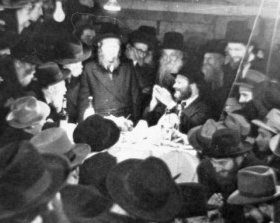Purim 5713 (1953): In Brooklyn, New York, a large crowd of Jews had assembled to farbreng (gather) with the Lubavitcher Rebbe.

Many of the participants had themselves just recently escaped from behind the Iron Curtain; a good number had personally suffered the wrath of Stalin’s tyranny, wasting away for years in Russian prisons. Still, many such Chasidim could not forget their oppressed brethren across the sea.
That year the Purim farbrengen commenced with a Chasidic Discourse on the verse "And he brought up Hadassah, who is Esther." As always, the Rebbe’s holy countenance underwent a visible transformation before beginning the Discourse, his elevated state signaling that he was about to utter the "words of the living G-d." Indeed, a few minutes later the Rebbe, may he be well, delivered his Discourse.
The farbrengen continued for the next several hours, in the course of which the Rebbe gave several talks, Chasidic melodies were sung, and numerous glasses hoisted for "Lechaim."
It was late at night - almost dawn, in fact - that an unusual thing occurred. For the second time that evening the Rebbe’s holy face began to radiate with that special solemnity and earnestness that meant he was preparing to deliver a Chasidic Discourse. The Chasidim could barely believe what was happening. The Rebbe had never delivered two Discourses at the same farbrengen.
The room was still. No one dared utter a sound. The Rebbe began to speak:
"After the czar fell in Russia, it was announced that the government would be holding elections. The Rebbe Rashab, fifth to Chabad dynasty, sent word to the Chasidim that they were to participate in the voting process. There was one particular Chasid who was completely removed from the affairs of the world; to him the political arena was foreign territory.
"Nonetheless, having received an explicit instruction from the Rebbe, he set out to fulfill his command. With a sense of awe and reverence he immersed himself in a mikveh, donned his gartel (belt for prayer) and set out for the polling booth.
"Of course, when he got there, he had no idea what he was expected to do, but some of the more worldly Chasidim helped him cast his vote. Adjusting his gartel, the Chasid did what everyone else was doing. When the votes were cast, everyone cried out ‘Hurrah!’ Taking his cue from those around him he likewise cried out, ‘Hurrah! Hurrah! Hurrah!’" (In Hebrew, the word "Hurrah" can also mean hu ra - he is evil.)
As he uttered these words, the Rebbe’s face burned with a holy fire. The Chasidim were astounded; they realized that more was going on than met the eye, but they did not understand the significance of what had just occurred. Swept up by the powerful emotion that filled the air, the crowd spontaneously rose to its feet and shouted, "Hurrah! Hurrah! Hurrah!" three times.
After this strange preamble the Rebbe delivered his second Discourse, based on the verse in the Megillah: "Therefore they called these days Purim, after the name of Pur [lot]."
In 1953, March 4 coincided with 17 of Adar. On that fateful day the Russian state radio in Moscow made the startling announcement that two days previously, Purim, Joseph Stalin had fallen gravely ill and had lost consciousness. The next morning, Adar 18, the whole truth was finally revealed: Stalin was dead. He died at the exact moment the Chasidim were shouting "Hurrah!" back in Brooklyn at the Rebbe’s farbrengen.
Although the terms rejoicing and gladness are not usually uttered in association with the city of Moscow, Jews throughout the Soviet Union breathed a collective sigh of relief, tempered, of course, by a realistic apprehension of the future. No one, however, could have imagined in his wildest dreams a more miraculous end to Stalin’s reign of terror.
At long last the "Doctor’s Plot" was over and countless prisoners were set free. In the awake of Stalin’s death the oppressive atmosphere in the Soviet Union was greatly lightened, and so ended one of the grimmest chapters in the annals of Russian Jewish history.

